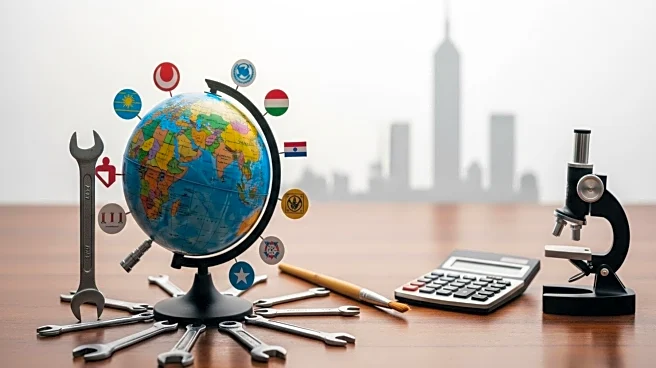What's Happening?
During the 80th United Nations General Assembly (UNGA) sidelines, India's External Affairs Minister S. Jaishankar emphasized the importance of a global workforce in a panel discussion organized by the Observer Research Foundation (ORF). He highlighted India's billion-dollar initiatives in drinking water and technology-driven development as examples of how national capacity building can contribute to global multipolarity. Jaishankar argued that self-reliance, technology, and multipolarity are interconnected, suggesting that the world should move towards a distributed workforce model that transcends demographic limitations. Despite existing challenges, he expressed optimism that trade will continue to find new and diverse arrangements among nations.
Why It's Important?
The call for a global workforce by India's Foreign Minister underscores the shifting dynamics in international relations where middle powers like India are playing a more significant role. This perspective is crucial as it highlights the potential for countries to collaborate beyond traditional power structures, fostering economic integration and cooperation. The emphasis on technology and self-reliance aligns with global trends towards digital transformation and innovation. For the U.S., this could mean new opportunities for trade partnerships and collaborations in technology and development sectors, potentially impacting economic policies and international trade strategies.
What's Next?
As nations like India advocate for a global workforce, there may be increased discussions and initiatives aimed at fostering international cooperation in workforce development. This could lead to new trade agreements and partnerships, particularly in technology and infrastructure development. Major stakeholders, including governments and multinational corporations, might explore collaborative projects that leverage diverse workforces. Additionally, there could be policy shifts towards supporting global workforce mobility and addressing demographic challenges through international cooperation.
Beyond the Headlines
The push for a global workforce also raises questions about the ethical and cultural implications of such a shift. It challenges traditional notions of national labor markets and could lead to debates on labor rights, immigration policies, and cultural integration. Furthermore, as countries like India advocate for multipolarity, there may be a reevaluation of global governance structures and the role of middle powers in shaping international policies.










